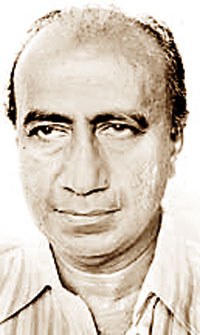Remembering the ‘Mighty Joe’ – Fairlie Dalpethado
View(s):By Supun Perera
It is ‘March Madness’, the time for the big match where fans, well-wishers, and devotees eagerly await a rousing battle. On March 22 and 23, at the Sinhalese Sports Club grounds, the action unfolds as 22 young warriors take the field for another exciting edition of the 90th series, the ‘Battle of the Saints’ cricket encounter between St. Joseph’s College and St. Peter’s College.
Both St. Joseph’s and St. Peter’s have produced a galaxy of cricketers, making this encounter one of the most anticipated cricket events in the country, steeped in intercollegiate traditional rivalry. Amidst the fun, camaraderie, and bonhomie associated with Joe-Pete, this article is dedicated to one of the finest cricketing personalities ever produced by the Darley Road institution: the legendary former All-Ceylon all-rounder, coach, and mentor par excellence, the late Fairlie Dalpethado. 
Many distinguished old boys have coached St. Joseph’s cricket, including names like Stannie Fernando, John Pulle, Malcolm Spittel, Malcolm de Costa, and James Perera. To this illustrious list, we can add relatively recent alumni such as Garry Melder, Carlton Bernadus, Harsha de Silva (under whose guidance St. Joseph’s last won the Joe-Pete in 2008), Asela Pathirana, and the present coach, Dilan Ramanayake. While all have excelled in their coaching roles, none have quite matched the mystique of Fairlie Dalpethado.
Fairlie’s coaching tenure spanned two significant stints, from 1968 to 1974 and again from 1978 to 1988. Despite his diminutive size, he was a mighty colossus in both stature and performance on and off the field. His motto, ‘Talk less, work more’, exemplified his approach, yielding rich dividends as a player, mentor, and coach. Representing St. Joseph’s from 1940 to 1943, his crowning moment came in 1943 when, under his captaincy, St. Joseph’s were crowned the undisputed inter-school cricket champions and triumphed in a match against a Combined Schools XI led by Vernon Prins. The Joe-Pete encounter didn’t materialise in 1943 due to the Second World War.
St. Joseph’s faced setbacks in 1965 and 1967 against their traditional rivals, St. Peter’s, necessitating heroic leadership to guide Josephian cricket. With Fairlie Dalpethado at the helm in coaching from 1968, results began to improve significantly. In 1970, St. Joseph’s engineered a successful coup under Hector Perera (Jnr) by winning the Rev. Fr. Maurice Le Goc Memorial Trophy from the Bambalapitiya School. This victory was followed by another triumph in 1972 under the captaincy of Rohan Fernando (Fido), defeating the Peterites led by Roy Dias, propelled by the heroics of left-arm paceman Rajeeve Benedict.
Players from this golden era of Josephian cricket vehemently endorse Fairlie’s inspirational and sentimental presence. His reputation preceded him, boosting morale both on and off the field, even when his advice was sometimes ignored. His humor fostered camaraderie, and his cricketing knowledge was evident through specific examples.
Another agreed with the fact of how humble he was and forthright to admit to being wrong. And also suspected that he admitted honestly those who had courage of their convictions in preference to those who uncritically accepted his advice.
Under his watchful eyes St. Joseph’s produced some outstanding cricketers. The players in the caliber of Lalit de S. Wijayaratne (Schoolboy Cricketer of the year in 1969), Brian Obeysekera, Hector Perera (Junior), Rohan Fernando (Fido), Garry Melder, Rohan Wijesinghe (both senior and Junior), Ashley de Silva, Brian Rajadurai, Jonathan Alles, Rukshan Soza, Rohan Weerakkody (Schoolboy Cricketer of the year 1987 and Sri Lanka youth captain) needs special mention.
Dalpethado, after leaving St. Joseph’s in 1943 turned out for SSC and Ceylon with distinction as an all-rounder. He played with some elites in the likes of Derrick de Saram, Mahadevan Sathasivam, Sargo Jayawickrema, D.S. Jayasundara, Hector Perera (Senior), Bertie Wijesinha and Ryle de Soysa, to name a few.
He not only excelled in cricket but was equally competitive in lawn tennis too, where he paired off and played alongside with De Saram brothers — namely Derrick, Robert and Koo.
Dalpethado was a great human being. He valued adherence to principles over personal victories. The great sportsman, coach and a mentor he was; always strongly believed and instilled among the Josephian cricketers that the game of cricket had to be played hard as it ought to be played but, above all it must be played clean as the game of gentlemen.
Equally his credo was never to gloat over victory nor to despair in defeat but to acknowledge defeat in dignity. It was very well encapsulated among the cricketers who belonged to the Dalpethado era of St. Joseph’s where it mushrooms from a famous ‘sportsmen prayer poem’ of American Poet Berton Braley.
“And if I should win, let it be by the code,
With my honour held high,
And if I should lose,
Let me stand by the road and cheer as the winners go by”
Though he passed away on January 6 of 2010 at the age of 85, without a fuss by hearing the call from his creator. It is the death that many a person dream of but becomes the preserve of only the best. It was in that sense he brought his own innings to a close sans any form of suffering or a lingering illness. Nevertheless, almost after a decade and a half his passing has left a void that can never be filled.


